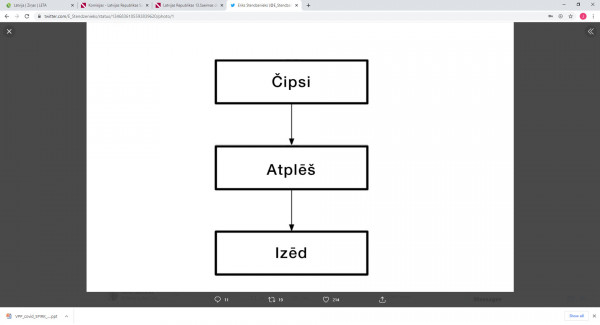Opposition: The executive power does not follow scientific advice to mitigate the effects of Covid
At the beginning of the year, the public was overwhelmed by a wave of outrage and ridicule caused by incomprehension of a flowchart in the tens of thousands euro funded research in search of a solution to the Covid crisis, which said cucumbers needed to be cut to make a salad. Now even the Saeima opposition is convinced that these emotions have been caused by the information being taken out of context and that Latvian scientists are doing a decent job. However, a lot more could be expected from the executive power, which does not rush to implement the findings of the educated men and women into reality.
At the beginning of January, a flowchart from the study “Restructuring Local Food Chains and Strengthening Sustainability during the Crisis and Post-Crisis in Latvia” led by Irina Pilvere, the Rector of the Latvia University of Agriculture, which reported: “Vegetable snacks. Cucumbers, tomatoes > cut > serve” was widely circulated on social media. The distributors of the initial information did not try to emphasize that the study is 430 pages thick and only 30 of them are dedicated to cooking flowcharts and recipes.
The aim of this project was to offer answers to questions related to the resilience of the economy to shocks, the promotion of local food production and economic self-sufficiency, the reduction of public debt risks, the reduction of the risk of human and knowledge outflows and others.

However, many commentators, without deeply analyzing the study, expressed the view that this was long-known and not newly created knowledge, while the wittiest ones created visually similar schemes that taught, for example, how to eat potato chips.
Following this uproar, the Ministry of Education and Science, under whose supervision the researchers were provided with funding for this and other Covid crisis solutions, announced that it would assess the quality of the work funded by the national Covid-19 mitigation program and recover the money if the results will be poor.
On Tuesday, the Public Expenditure and Audit and Social and Labor Affairs Committees of the Saeima also addressed this issue. Inese Kalvāne, a member of the State Audit Office, also participated in the meeting. She confirmed that the State Audit Office is working on verifying the use of the allocated funding - checking the funding distribution process and the adequacy of expenses - but the results of its work will be known only in May.
In addition to the representative of the State Audit Office, representatives of the Ministry of Education and Science and people of the academic world also took part in the meeting, who managed to convince even the most critical representatives of the opposition about the quality of their work. The critical attitude towards the ability of the coalition to use the fruits of scientists' labor has, of course, not disappeared.
"The advice from scientists was very much related to the economy, health and well-being. And between the lines of what scientists have said, I have heard that the executive power is careless in reading their findings and does not put them into practice [..] I used to be skeptical about spending millions, but now I believe that scientists' work should be valued and put into practice or rejected if justified,”
says Andrejs Klementjevs of Harmony (Saskaņa), who believes that initially the work of scientists was discredited to make it easier to ignore the results of their research.
Viktors Valainis, representing the Union of Greens and Farmers (Zaļo un Zemnieku Savienība), also points out that the initial uproar was caused around information taken out of context, but the most important thing is how the state uses these studies.
"There is a feeling that everyone ignores them. Research has been done, but there is no feeling that anyone is interested and would use it in life [..] Research is by nature very in-depth, a huge number of people are involved in its preparation, but if they are ordered, millions have been spent and then they are ignored, it is wasteful of government parties,” V. Valainis believes.
Kaspars Ģirģens (KPV LV), the head of the Public Expenditure and Audit Committee, says that this is why the commission will turn to the Ministry of Education and Science to provide detailed information on what research results have been or have not been implemented and why. If it is found that public money has been wasted, the commission will also demand its return.